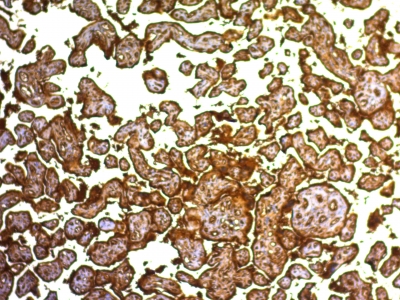Human Anti-Placental Alkaline Phosphatase Antibody Product Attributes
Placental Alkaline Phosphatase Previously Observed Antibody Staining Patterns
Observed Subcellular, Organelle Specific Staining Data:
Anti-Alpp antibody staining is expected to be primarily localized to the plasma membrane.
Observed Antibody Staining Data By Tissue Type:
Variations in Placental Alkaline Phosphatase antibody staining intensity in immunohistochemistry on tissue sections are present across different anatomical locations. An intense signal was observed in trophoblastic cells in the placenta. More moderate antibody staining intensity was present in trophoblastic cells in the placenta. Low, but measureable presence of Placental Alkaline Phosphatase could be seen inglandular cells in the cervix, uterine, squamous epithelial cells in the cervix and uterine. We were unable to detect Placental Alkaline Phosphatase in other tissues. Disease states, inflammation, and other physiological changes can have a substantial impact on antibody staining patterns. These measurements were all taken in tissues deemed normal or from patients without known disease.
Observed Antibody Staining Data By Tissue Disease Status:
Tissues from cancer patients, for instance, have their own distinct pattern of Placental Alkaline Phosphatase expression as measured by anti-Placental Alkaline Phosphatase antibody immunohistochemical staining. The average level of expression by tumor is summarized in the table below. The variability row represents patient to patient variability in IHC staining.
| Sample Type | breast cancer | carcinoid | cervical cancer | colorectal cancer | endometrial cancer | glioma | head and neck cancer | liver cancer | lung cancer | lymphoma | melanoma | ovarian cancer | pancreatic cancer | prostate cancer | renal cancer | skin cancer | stomach cancer | testicular cancer | thyroid cancer | urothelial cancer |
|---|---|---|---|---|---|---|---|---|---|---|---|---|---|---|---|---|---|---|---|---|
| Signal Intensity | – | – | – | – | + | – | – | – | – | – | – | + | – | – | – | – | – | +++ | – | – |
| ALPP Variability | + | + | ++ | + | ++ | + | + | + | + | + | + | ++ | + | + | + | + | ++ | + | + | + |
| Placental Alkaline Phosphatase General Information | |
|---|---|
| Alternate Names | |
| Alkaline phosphatase, placental type, placental alkaline phosphatase, PLAP, | |
| Molecular Weight | |
| 70kDa | |
| Chromosomal Location | |
| 2q37.1 | |
| Curated Database and Bioinformatic Data | |
| Gene Symbol | ALPP |
| Entrez Gene ID | 250 |
| Ensemble Gene ID | ENSG00000163283 |
| RefSeq Protein Accession(s) | NP_001623 |
| RefSeq mRNA Accession(s) | NM_001632 |
| RefSeq Genomic Accession(s) | NC_018913, NC_000002, NG_012189 |
| UniProt ID(s) | B2R7C7, P05187 |
| UniGene ID(s) | B2R7C7, P05187 |
| HGNC ID(s) | 439 |
| Cosmic ID(s) | ALPP |
| KEGG Gene ID(s) | hsa:250 |
| PharmGKB ID(s) | PA24730 |
| General Description of Placental Alkaline Phosphatase. | |
| Reacts with a 70kDa membrane-bound isozyme (Regan, Nagao type) of Placental Alkaline Phosphatase (PLAP) occurring in the placenta during the 3rd trimester of gestation. It is highly specific for PLAP, shows no cross-reaction with other isozymes of alkaline phosphatase. Anti-PLAP reacts with germ cell tumors, can discriminate between these, other neoplasms. Somatic neoplasms e.g. breast, gastrointestinal, prostatic,, urinary cancers may also immunoreact with antibodies to PLAP. Anti-PLAP positivity in conjunction with anti-keratin negativity favors seminoma over carcinoma. Germ cell tumors are usually anti-keratin positive, but they regularly fail to stain with anti-EMA, whereas most carcinomas stain with anti-EMA. Anti-PLAP has been useful in the diagnosis of gestational trophoblastic disease. | |




Reviews
There are no reviews yet.